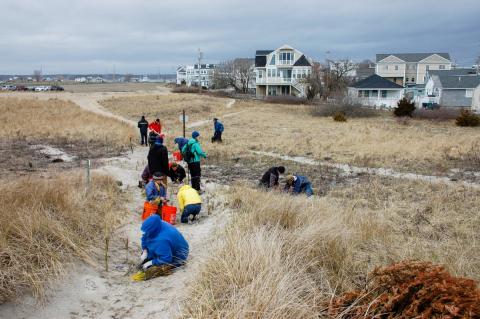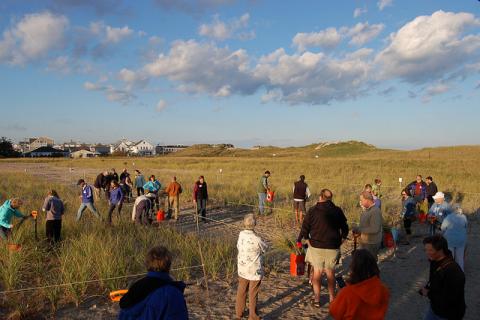What is Dune Restoration?

Dunes are extremely important natural features for coastal resilience. Compared to their neighbor, the beach, dunes are sometimes overlooked, but they are a vibrant and critical ecosystem in their own right. Dunes provide a sand source to nourish eroding beaches, protect inland infrastructure by acting as a barrier to storm surge and flooding, and serve as habitats for wildlife. Because degraded dunes lose some of their ability to play some of these important roles, protection and restoration is vital for coastal ecosystems and communities.
The Coastal Research Volunteers team up with UNH's Coastal Habitat Restoration Team, which works to restore and maintain healthy dunes in New Hampshire and Massachusetts through a very grass-roots approach. Along with the Restoration Team, volunteers plant native grasses, install sand fencing, post educational signage, and actively survey the dunes to document sand gains and losses. Volunteers are also active participants in research on dune resilience and restoration methods.
What do Dune Restoration Volunteers Do?
Most dune restoration volunteers contribute by joining one of our many beachgrass planting events, which happen every year in the spring and fall. But there are lots of ways to be involved, like helping with sand fencing, attending community planning meetings, maintaining the beachgrass Common Garden, and removing invasive species. Opportunities will be advertised locally in coastal communities and in the Coastal Research Volunteers newsletter.
You are welcome to contribute as much as you are able! Most restoration events last for a few hours.
To see the impacts of the Coastal Habitat Restoration Team's work, you don't have to look farther than the beaches we work on. In addition to planting hundreds of thousands of beachgrass plants, the Restoration Team has established 25 permanent dune survey transects, a community garden of dune grass used for restoration, and works closely with coastal Conservation Commissions to facilitate public meetings. The Team has worked with over 1000 students and 30 teachers in dune restoration work; building coastal resilience is truly a community effort!
- Interest in improving coastal resilience and strengthening coastal communities
- Meet people from your community with similar interests
- Opportunities to engage with local community groups, Conservation Commissions, and others involved in coastal communities
- Contribute to ongoing efforts to improve our understanding of beach resilience
Join our dune restoration and research effort!
To stay informed about our 2020 restoration season sign up for our newsletter or contact Wells.
Are you a coastal property owner looking to restore native dunes on your property? Contact Wells for more information about how to access free beachgrass and other native species from our dune plant common garden.
Links, resources, and partner organizations

Want to learn more? Read all about the Coastal Habitat Restoration Team's efforts in Newbury, MA, check out this fact sheet for homeowners on reducing coastal erosion and storm damage, and read through this article in the Seacoast Online about the Coastal Habitat Restoration Team's work on the dunes in Seabrook.
Finally, watch this fantastic short video made by UNH documenting a school field trip planting beachgrass on Plum Island, Massachusetts!
November 9, 2015 - Community Volunteers Join Dune Restoration Effort - Hampton Union
May 30, 2017 - Students Work to Fortify Plum Island Dunes - The Eagle-Tribute
November 8, 2017 - On N.H.'s Coast, Preparing for Future Storms with Grass, Sand, and a Bit of Time - NHPR
May 31, 2018 - Repairs Underway on Sand Dunes Damaged by Nor'Easters - WMUR
